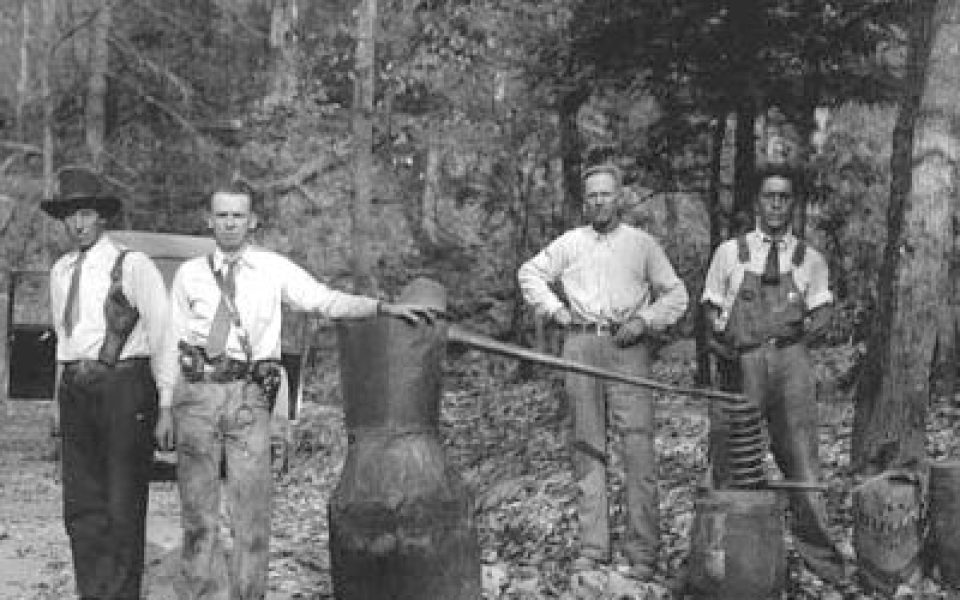
I have always said that “government” has nothing against “likker.” It just wants its cut! And its cut comes from taxes. We have never been too keen on paying taxes on likker here in North Carolina. And the feds have never had reservations about using force to collect them. The examples are legion.
They hanged some patriots in Alamance County in the 18th Century — “Regulators,” they called them — and with guns blazing they have chased otherwise law-abiding, good ole boys through briars, brambles, riverbottoms and mountain hollows all over the Old North State. They have even locked up for a time some of our most celebrated citizens, such as NASCAR legend Junior Johnson and inventor David Marshall “Carbine” Williams. To be fair, a deputy sheriff did get in the way of one’s of Carbine’s bullets. Carbine shot him dead!
They even got one of our food heroes, Carson Barnes, who died a few years ago. He was the state’s largest producer of sweet potatoes and a leader in the industry. I heard Carson say, “I got out of jail AGAIN for making likker and my friends came to me and told me I had to find a legal way to make a living. It turned out to be raising sweet potatoes.”
All of this is to say that government people take likker seriously — from federal revenuers to deputy sheriffs inadept at dodging bullets and even state legislators.
So when you start trying to fool around with the likker laws in our state, you have an entrenched bureaucracy that still thinks government, particularly the state and local ABC Boards, ought to operate pretty much as they please. This is not that uncommon for bureaucrats, but our ABC laws are especially archaic; our model has been scuttled in most other states. And, well, as to restaurants that serve likker, they have just had to grin and bear it.
So kudos for the North Carolina Restaurant and Lodging Association for taking on the task this year of modernizing our likker regulations and, I hope, moving us closer to the time when distilled spirits will be treated in much the same manner as beer and wine. It is a powerful industry group and its membership includes some, but not enough, of our better locally owned restaurants. Likker sales are vital to their bottom lines and dealing with ABC regs has long been a daily hassle. Thanks to NCRLA’s efforts, 26 changes were made in the current session of the General Assembly.
Here are some “for instances.”
Remember that in any business, time is money. Restaurants can now use electronic payment for their liquor orders and use online forms to order. ABC stores can now make deliveries to restaurants, or restaurants can contract with a delivery service. Local ABC Boards are not required to make deliveries but have the option. Restaurants already pay a huge premium of each bottle –— dollars more than the ordinary patron — so they should extend this service like any other purveyor.
Food halls can now secure a permit that all vendors can share in common spaces. Restaurants can purchase individual bottles of distilled spirits through the special-order process. Currently the minimum purchase is typically a full case.
And the new regulations decree that restaurants can serve distilled spirits in indoor and outdoor areas that the permittee controls.
Someone said that the most uncommon thing in the world is common sense. It was past time for legislators to take a commonsense approach to our liquor laws, and NCRLA helped them do that.
At least to me, it seems that legislators spend a lot of time fixing things that aren’t broken. So this is a refreshing change.
Now it is time to give a hard look at whether the state should continue to have a monopoly on the sale of distilled spirits, or “likker” as I call it, through its ABC stores.
Join the First Amendment Society, a membership that goes directly to funding TCB‘s newsroom.
We believe that reporting can save the world.
The TCB First Amendment Society recognizes the vital role of a free, unfettered press with a bundling of local experiences designed to build community, and unique engagements with our newsroom that will help you understand, and shape, local journalism’s critical role in uplifting the people in our cities.
All revenue goes directly into the newsroom as reporters’ salaries and freelance commissions.


Leave a Reply